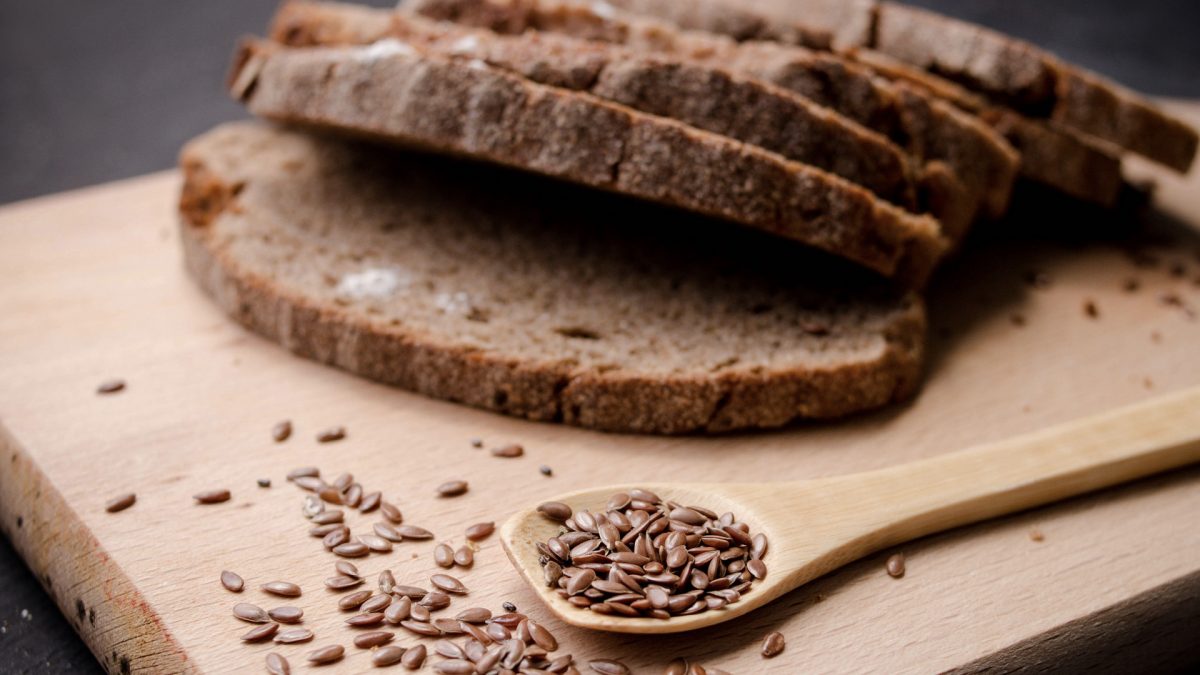
Image Credit: Marco Verch / Flickr. This image has been modified.
Previously, I’ve explored the beneficial effects of flaxseeds on prostate cancer (Flaxseeds vs. Prostate Cancer), as well as breast cancer prevention and survival (Flaxseeds & Breast Cancer Prevention and Breast Cancer Survival & Lignan Intake). The cancer-fighting effect of flaxseeds is thought to be because of the lignans, which are cancer-fighting plant compounds found in red wine, whole grains, greens (cruciferous vegetables), and especially sesame seeds and flaxseeds, the most concentrated source on Earth. But this is based on per unit weight. People eat a lot more grains than seeds. Of the grains people eat, the highest concentration of lignans is found in rye. So, can rye intake decrease the risk of cancer? Theoretically yes, but unlike flaxseeds, it’s never been directly put to the test… until now.
In my video Does Rye Bread Protect Against Cancer?, I discuss the evidence that does exist. If you measure the levels of lignans in the bloodstream of women living in a region where they eat lots of rye, the odds of breast cancer in women with the highest levels do seem to be just half that of women with the lowest levels. But lignans are also found in tea and berries, so we couldn’t be sure where the protection is coming from. To get around this, researchers decided to measure alkylresorcinol metabolites, a class of phytonutrients relatively unique to whole grains.
Researchers collected urine from women with breast cancer and women without, and the women with breast cancer had significantly lower levels compared to those without. This suggests that women at risk for breast cancer consume significantly lower amounts of whole grains like rye. But if we follow older women in their 50s through 60s, the intake of whole grain products was not associated with risk of breast cancer. A similar result was found in older men for prostate cancer. Is it just too late at that point?
We know from data on dairy that diet in our early life may be important in the development of prostate cancer, particularly around puberty when the prostate grows and matures. If you look at what men were drinking in adolescence, daily milk consumption appeared to triple their risk of advanced prostate cancer later in life. (Learn more about milk and prostate cancer in my video Prostate Cancer and Organic Milk vs. Almond Milk.) So, researchers looked at daily rye bread consumption during adolescence.
Those who consumed rye bread daily as kids did appear to only have half the odds of advanced prostate cancer. This is consistent with immigrant studies suggesting that the first two decades of life may be most important for setting the pattern for cancer development in later life. These findings are certainly important for how we should feed our kids, but if we’re already middle-aged, is it too late to change course? To answer this question, researchers in Sweden put it to the test.
Researchers took men with prostate cancer and split them into two groups. One group got lots of rye bread, while the other got lots of high-fiber, but low-lignan, wheat bread. There’s been some indirect evidence that rye may be active against prostate cancer—like lower cancer rates in regions with high rye consumption—but it had never been directly investigated… until this study. Biopsies were taken from the subjects’ tumors before and after three weeks of bread eating, and the number of cancer cells that were dying off were counted. Though there was no change in the cancer cell clearance of the control bread group, there was a 180% increase in the number of cancer cells being killed off in the rye group. A follow-up study lasting 6 weeks found a 14% decrease in PSA levels, a cancer marker suggesting a shrinkage of the tumor.
The researchers note they used very high rye bread intakes, and it remains to be tested if more normal intake levels would have effects that are of clinical importance. As a sadly typical American, my lack of intimate familiarity of the metric system did not flag the “485 grams” of rye bread a day as far out of the ordinary, but that translates to 15 slices! Rather than eating a loaf a day, the same amount of lignans can be found in a single teaspoon of ground flaxseeds.
I’ve created several videos on flaxseeds for both breast cancer prevention and treatment, including Flaxseeds & Breast Cancer Prevention, Breast Cancer Survival and Lignan Intake, Flaxseeds & Breast Cancer Survival Epidemiological Evidence, and Flaxseeds & Breast Cancer Survival: Clinical Evidence.
What’s more, flaxseeds may help with cyclical breast pain (Flaxseeds for Breast Pain), prostate cancer (Flaxseed vs. Prostate Cancer), diabetes (Flaxseeds vs. Diabetes), and hypertension (Flaxseeds for Hypertension).
And if you’re wondering Which Are Better: Chia Seeds or Flaxseeds?, get the answer in the video!
The wonders of whole grains are also discussed in Whole Grains May Work as Well as Drugs, Can Oatmeal Reverse Heart Disease?, and Can Oatmeal Help Fatty Liver Disease?.
In health,
Michael Greger, M.D.
PS: If you haven’t yet, you can subscribe to my free videos here and watch my live, year-in-review presentations:
- 2012: Uprooting the Leading Causes of Death
- 2013: More Than an Apple a Day
- 2014: From Table to Able: Combating Disabling Diseases with Food
- 2015: Food as Medicine: Preventing and Treating the Most Dreaded Diseases with Diet
- 2016: How Not To Die: The Role of Diet in Preventing, Arresting, and Reversing Our Top 15 Killers